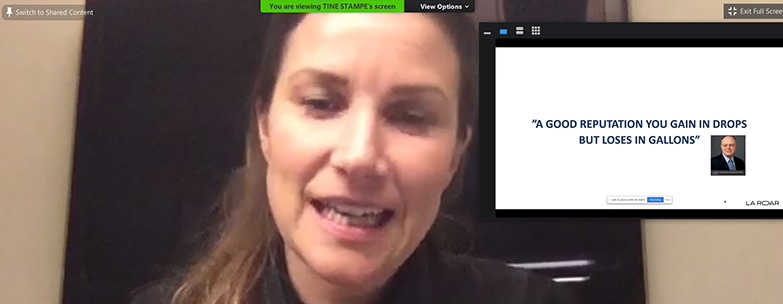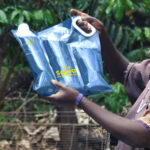Event speakers share branding tips for innovative start-ups
Branding is especially important for innovation-based start-ups. Danish hospitals can help you build your healthcare brand with co-creation procedures. Even small on-line mis-steps can damage your brand. Creating a fictional customer based on real data makes marketing your brand easier. These were four central take home messages from a November 25th. “Brew Your Own”-webinar about branding for innovation based start-up companies. The webinar was hosted by Copenhagen Science City in collaboration with Biopeople.
Branding secures long-term revenue streams
The role of the brand has evolved over time. From a simple assurance of quality over lifestyle symbols to embodying the core identity of a company. According to Richard Gyrd-Jones, a modern brand should tell the story of how your product will transform the life of your customer. Gyrd-Jones is a Professor at Copenhagen Business School and leads their study programme for Brand and Communication Management. He feels that the branding is at least as important as the business model.
If you focus exclusively on your revenue stream and your product development, you risk losing sight of the passion that made you start your own business. This is a special risk for tech-entrepreneurs. They tend to believe that the tech will sell itself, but your brand is the bridge between your company and your customer. If you cannot explain how your product will transform the life of your customer, you may never connect and resonate with your customer to build long-term value”: Richard Gyrd-Jones, Professor, CBS.
Procurement rules open hospitals for co-creation of start-up brands
Branding a product for the health-and-care sector is especially challenging and risky. However, innovative public procurement approaches is making it easier for start-ups to break into the Danish hospital sector, explained Louise Brink Thomsen. Thomsen is a Project Manager in the Department for Procurement Development and Strategic Partnerships at The Capital Region of Denmark. She shared insights about procurement rules allowing hospital clinics to engage in co-creation of new products.
New technology and new business models are essential to future healthcare. The required innovation can be achieved through several different available procurement procedures. An example of a type of innovative procedures that procurement departments in the Danish healthcare sector have at their disposal are public-private innovation partnerships that are fit for product co-creation. Buying new products is still highly regulated in the sector, but following these methods our hospitals are able to engage with companies in the branding and development of products. Collaborating with the hospitals sector has many benefits for companies. For one, it can reduce the risk of market failure of new products, which is especially relevant for early stage start-ups”: Louise Brink Thomsen, Project Manager, The Capital Region of Denmark.
Health claims and regulations
Where sellers to the healthcare system have to navigate restrictions on who the hospitals can buy from, sellers of dietary supplements face restrictions on what they are allowed to tell private customers about their brand. Tine Stampe co-founded La Roar Life Science to provide high quality vitamin supplements to women and men who want to start a family. After extensive brand development with focus groups helped determine the look and feel of products, Stampe determined that social media was the perfect channel to build a customer base. She also found that EU law is very strict about the health claims you can make about supplements. La Roar Life Science is now highly conscious about the fine line between promotion, which is legal, and claims, which are not.
We are very aware of how we interact with our audience. We educate the influencers we use on social media, and we have built compliance into the very fabric of our branding strategy. Communicating directly to consumers, we need a high level of understanding of our audience and a high level of compliance with regulations in our field. As a start-up we are learning, and learning is not always being perfect from the start. If you enter a field with compliance issues, I suggest you take the time to listen to user-feedback, and ask compliance specialist when in doubt. ”: Tine Stampe, co-founder, La Roar Life Science.
Not one, but two, artificial customers for B2B-selling
An important aspect of branding is to figure out how your ideal customer will react to messages and the look and feel of your product. Conventional wisdom has it, that branding is less important, when you sell business to business, but Matias Welsien Thomasen worked very hard on understanding potential customers for his start-up. Thomasen is the Chief Brand Officer & Co-founder of the start-up Pleaz. Pleaz helps workplaces encourage well-being in their staff by providing video-based activity breaks for workers who spend too much time sitting.
We knew that the person who uses our product would not be the one who decides to buy it. In order to tailor our branding to this situation, we created two different ideal customers. So called personas. We described gender, age, tasks, preferences and much more for an idealized buyer and an idealized end user. This helped us in making all decisions about messages and the look and feel of our brand”: Matias Welsien Thomasen, Chief Brand Officer & Co-founder, Pleaz.
What Brew Your Own are and who plans them
Copenhagen Science City planned and executed this “Brew Your Own” webinar in collaboration with Biopeople, Denmarks Life Science Cluster, which is a network organization bridging bioscience business and academic research. Brew Your Own events are aimed at entrepreneurs interested in co-creating with academics as well as at researchers and students interested in starting their own business or working for a start-up. The events provide inspiration, information and motivation.




